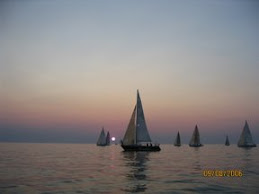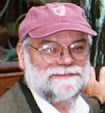On the ferryboat Brian and I met an American girl--I think we were the only Americans aboard that trip. Turned out this girl was from Eastlake, Ohio. I knew of her father's clothing store at E.222nd Street in Euclid. I even knew one of her cousins.
When we got off the ferry boat in Iraklion, we hitched a ride on a tiny motor scooter (well one of us did) and then got to the main road that crossed the island. Our destination was Matala, the tiniest of villages, on the southern coast of the island. Hitchhiking was tough because there was almost no traffic. Almost no one owned a car. We finally got a ride in a dump truck. The Eastlake girl and I (and the guitar) got in the front seat with the driver. Brian wanted to ride up on the load of gravel--a dangerous and uncomfortable position for him. While we were driving, we tried to communicate with the driver, but it was difficult. We only knew a few phrases of Greek, and he knew just a little English. He did know some German, so between these three languages he told us of the assassination of Martin Luther King. Still, I could hardly believe what I heard, and it would be hours more before King's murder was confirmed for us.
On that trip across Crete, we stopped at an archaeological site (very famous, very important, unbeknownst to us) called Phaistos.
 |
| Image of Phaistos, found in Wikipedia |
We spent some time looking around the site, and then proceeded to the long walk to the village of Matala. On the way there, a man saw Brian carrying his guitar and invited us into his house. He wanted to show us his bouzouki, a spectacular instrument that must have cost the equivalent of weeks of work. We got to meet his entire family, and we took this beautiful photo with his three children. What a blessing to be invited into this home!
 |
| Matala, Crete family--circa April 5, 1968 (this might have been closer to Pitsidia than Matala) |
 |
| A view of one of Matala's cliffs, with caves. [WWW.visitMatala.com] |
A year or two later Joni Mitchell came to Matala. She wrote a beautiful song about the village and the "Mermaid Cafe" and the local wine and a boy named "Carey." I'll try to find a Youtube version of that:
So that was the day we learned Martin Luther King died. While in Crete, we had no news, no telephone, nothing, So we didn't have any sense of how America exploded after the assassination.
Postscript. I had a couple more memories of that visit to Matala and Crete I thought I'd mention. When Brian Wilson and I were walking to Matala, we passed through a little village where we saw people dining outside. I noticed they were eating escargot--snails. That was the first time in my life I saw people eating that! I'm guessing this was the village of Pitsidia. Maybe that's the town where we met the Greek family seen in the photo above.
Here's another strange memory. As we were hitchhiking back to Iraklion, an army convoy drove by us, then stopped and told us to get into the troop truck. We got in, with our guitar and backpacks. About 20 soldiers sat stiffly inside the truck, not speaking to us. Then, a few minutes later, someone in charge, maybe a sergeant or an officer, ordered us to get out of the truck. We had no idea what was going on. I do remember seeing the soldiers' weapons during this incident, but I wasn't really afraid. About a week later, in the Northern Italian (German-speaking) town of Bolzano, I was searched by an Italian federal policeman, a "carabinieri," with his machine gun pointed at me. Again, that ended without an actual arrest and with no violence.
Postscript. I had a couple more memories of that visit to Matala and Crete I thought I'd mention. When Brian Wilson and I were walking to Matala, we passed through a little village where we saw people dining outside. I noticed they were eating escargot--snails. That was the first time in my life I saw people eating that! I'm guessing this was the village of Pitsidia. Maybe that's the town where we met the Greek family seen in the photo above.
Here's another strange memory. As we were hitchhiking back to Iraklion, an army convoy drove by us, then stopped and told us to get into the troop truck. We got in, with our guitar and backpacks. About 20 soldiers sat stiffly inside the truck, not speaking to us. Then, a few minutes later, someone in charge, maybe a sergeant or an officer, ordered us to get out of the truck. We had no idea what was going on. I do remember seeing the soldiers' weapons during this incident, but I wasn't really afraid. About a week later, in the Northern Italian (German-speaking) town of Bolzano, I was searched by an Italian federal policeman, a "carabinieri," with his machine gun pointed at me. Again, that ended without an actual arrest and with no violence.


No comments:
Post a Comment